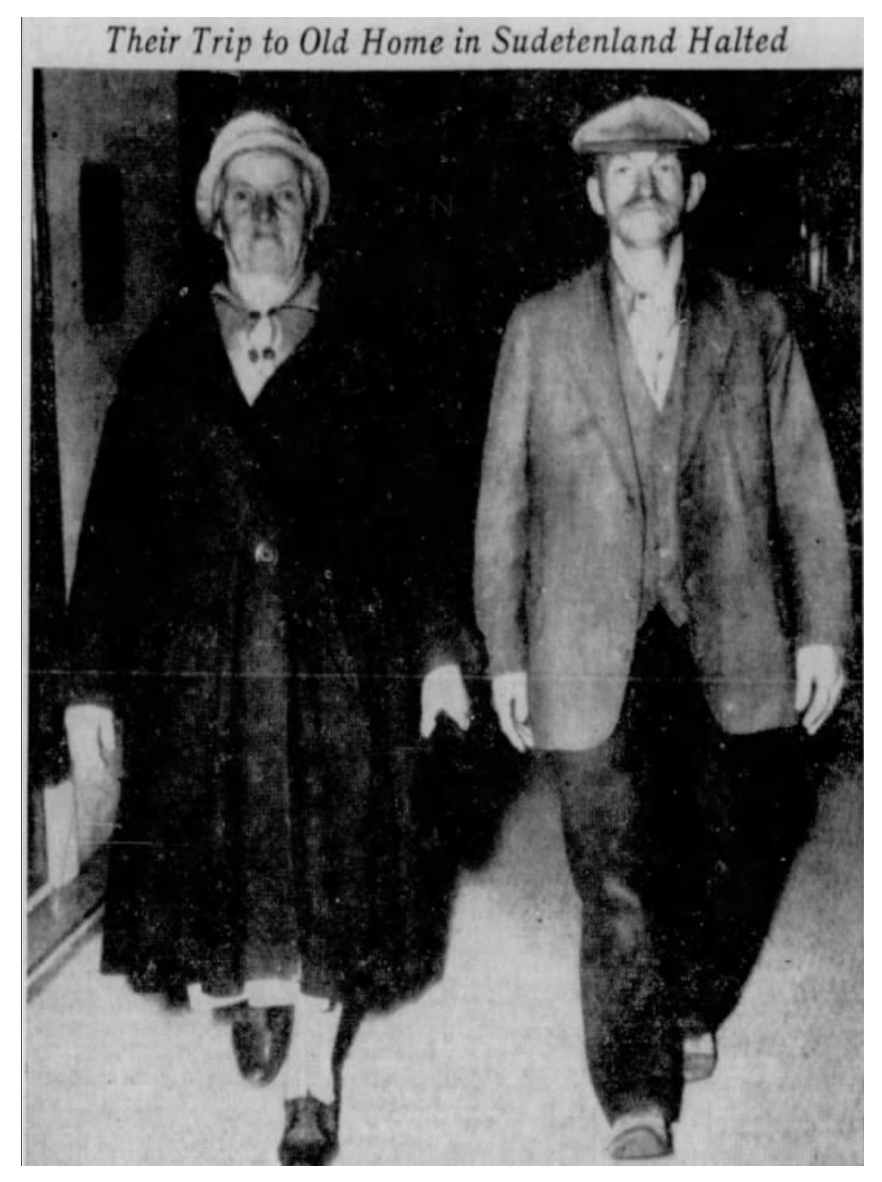The Sudetenland, a region located in the western part of what was Czechoslovakia (The Czech Republic until 2016, and is now called Czechia) has a long and complicated history that has been marked by controversy and conflict. The area is known for its cultural diversity, and strategic importance, which has made it a coveted prize for many neighboring countries throughout the centuries.

If any group of people can claim a connection to the 1930s Dust Bowl, it is Baca Countians. The Dust Bowl, also known as the Dirty Thirties, was a period of severe dust storms and soil erosion that affected the Great Plains region of the United States during the 1930s.. The dust storms were so severe that they caused widespread damage to crops, livestock, and homes, and forced many farmers to abandon their land and migrate to other parts of the country in search of work.
The inspiration for this article came from a newspaper clipping shared by Springfield resident Randy Cooper, which highlights an unusual story about a couple of Pritchett residents from 1939. The clipping has no reference or date of the events described, but the content within led to a treasure trove of articles from the same year.
The intent of Pritchett residents Frank and Theresa Mauler to visit Sudetenland caught the attention of news outlets across the US ranging from The Miami News (Miami, Florida) 29 Jan., 1939 to The Spokesman-Review (Spokane, Washington) 29 Jan., 1939 and many publications in between. All references to this event are in early 1939.

Sudetenland: A History of Controversy and Conflict
The history of Sudetenland dates back to the Middle Ages when it was part of the Kingdom of Bohemia. The region was inhabited by various ethnic groups, including Czechs, Germans, and Jews, who coexisted relatively peacefully for centuries. However, tensions started to rise in the early 20th century when nationalist sentiments began to take hold in Europe.
In 1918, Czechoslovakia was established as a new country after the dissolution of the Austro-Hungarian Empire. The Sudetenland, which was predominantly inhabited by ethnic Germans, became part of the new country. This decision was met with opposition from some Germans who saw it as a violation of their rights.
In the 1930s, Adolf Hitler’s Nazi Germany began to assert its dominance over Europe. Hitler, who was himself an Austrian of German descent, sought to unite all German-speaking people under his rule. He saw the Sudetenland as a vital part of this plan and demanded that it be ceded to Germany.
The Czechoslovak government initially resisted Hitler’s demands, but tensions escalated, and war seemed imminent. In September 1938, leaders from Germany, Italy, Britain, and France met in Munich to negotiate a solution. The Munich Agreement allowed Hitler to annex the Sudetenland, but he promised that this would be his last territorial demand. The annexation of Sudetenland was a significant victory for Hitler, but it did not satisfy his appetite for conquest. The following year, Germany invaded Poland, and World War II began. After the war, the Sudetenland was returned to Czechoslovakia, but its German population was expelled. This decision was met with criticism from some quarters, with many arguing that the expulsion was unjust and cruel.
Today, the Sudetenland is part of the Czech Republic, and its complex history continues to be a subject of debate and discussion.
Former Arkansas Farmer and Wife to Visit Europe

The Journal-Advance (Gentry, Arkansas) 2 Feb 1939 reported the following: Frank Mauler, 59 years old, and his wife Theresa, stopped off on Friday on the first leg of their journey to Mauler’s old home in Europe because, Mauler said, “My father would like to see me before he passes away.” The Maulers are former peasants who have made a frugal living since coming to the United States in 1901 and settling on farms in Kansas, Arkansas, and Colorado. They did not have passports and had already spent $100 of their life savings of $500 on their trip across the continent. The Travelers Aid Society helped them make arrangements to sail on Monday on the Rotterdam. Their ultimate destination is “Pinkaute No. 53,” the house where Mauler was born in a village in Sudetenland, now a part of Germany.
Mr. and Mrs. Mauler lived for several years on a farm northwest of Gentry. They moved from there to Colorado about four years ago. Two daughters, Mrs. Merl Jones and Mrs. Leach live near Cherokee, and a son, Frank Mauler, lives near Concord.
Blue Ribbon Stock’ From U. S. to Pay His Way in Naziland

Mr. and Mrs. Frank Mauler of Pritchett, Colorado, will be visiting Pinkaute, Sudetenland, in about another week. Don’t put your hand out because Mr. Mauler will try to put a dime in it.
Mr. Mauler has tried to put dimes in the hands of traveler’s aid agents, German consulate attaches, and customs house officials because he is a sport.
Who would expect that a sport would tuck his $500 life savings into his pocket, bundle his mother into her Mack coat, and set out for the faraway Sudetenland to see his 92-year-old father? Take good care of the Maulers, Chancellor, because they are a couple of middle-aged babes in the woods, and you will love them as much as anyone who has had the bewildered darlings in tow since they reached New York City via a day coach and emerged, hand in hand, into the vast hall that is Grand Central Station.
Mr. Mauler is sturdy old-world stock, 59 years old and sound as a bell. Theresa is 67. They live 70 miles from the railroad in Colorado, and they farm a piece of prairie land that a chicken wouldn’t waste her claws on. “But we never were hungry,” says Mr. Mauler. “A loaf of bread we had for tomorrow all the time. We eat nothing before we go on credit. Mama would starve before she does that.” That will give you an idea of the kind of people they are, Chancellor. Thrifty, proud, independent. That’s why Mr. Mauler wants to tip everybody. “I pay for what I get,” he says. The Maulers got this idea of visiting the old country when Frank’s father wrote that he would like to see him just once more. So, here they are in New York City, and on Monday, they sail third class for Rotterdam. They thought all you had to do was climb on the boat and sail, so it’s taken a little while to get them fixed up with passports and one thing and another.
Down at the German consulate, Frank sank to his knees in front of the big spread eagle above the door. Somebody asked him if he loved Germany that much. “Germany?” asked Frank, puzzled. “But that is an eagle, that is America. I always love America.”
Don’t feel too bad about that thought, Chancellor. He thinks pretty well of you with one slight reservation. “He is an Austrian,” he said about you, Chancellor. “He was born and raised in Austria. God gave him power for Austria. I read all about that.” And then came the reservation: “If he wants all the time more, that isn’t right. I am against that.”
Your best friend might be thinking that, Chancellor, so don’t hold it against an old man. Take good care of Frank and Theresa. They are a part of the West. “A loaf of bread for tomorrow, all the time. We eat nothing before we go on credit.”
You won’t be able to see the class under the funny clothes, but they’re blue ribbon stock, chancellor. Colorado is proud of them.



Following this brief bit of publicity, the record of Frank and Theresa Mauler appears to be nonexistent. I have not been able to confirm any record (so far) of them later than the news of them intending to travel to Sudetenland. I can’t even tell if they actually got on the ship. There might be a link in Pennsylvania later, but because of alternate spellings of names I have not been able to confirm.
It would have been extremely risky to travel to Sudetenland in January of 1939, as this was a highly volatile and politically charged time in Europe, leading up to the outbreak of World War II later that year.

In January 1939, tensions between Germany and Czechoslovakia remained high, as Germany continued to make demands on the Czech government and agitate for further territorial concessions. The possibility of war was very real, and many people were fleeing the region in anticipation of violence. Traveling to Sudetenland at this time would have put the Maulers at risk of being caught up in any conflict or violence that might erupt, as well as being subject to potential arrest, detention, or other mistreatment by the Nazi authorities. Additionally, many countries had begun imposing travel restrictions and advisories on their citizens in light of the deteriorating situation in Europe, making travel to Sudetenland even more perilous.
The story of Frank and Theresa Mauler’s intention to visit Sudetenland in 1939 adds another layer of intrigue to the already complicated history of the time and this region. The Maulers’ journey, motivated by a desire to reunite with Frank’s father, highlights the personal connections and human stories that can be obscured by larger geopolitical events. The fact that the Maulers’ story appears to disappear from the historical record after their initial mention in the news is a reminder of how many untold stories and forgotten experiences are hidden within the past. Ultimately, the Maulers’ risky decision to travel to Sudetenland in a politically charged and dangerous time as well as their frugalness serves as a testament to their courage and determination. Their story is another unusual chapter in the larger narrative of the Dust Bowl and its impact on the people who lived through it.



One response to “Baca County’s Connection to 1939 Czechoslovakia: Another Unusual Baca County Dust Bowl story.”
I patrolled the roads of Baca County for nearly twenty seven years.
Heard several stories that are brought to light by Ken Brooks and his research into the past.
One comment that is so true, if we only knew what has occurred
and traveled though Baca County.
Very good stories.
Really enjoyed the article s.
Ronald Stewart